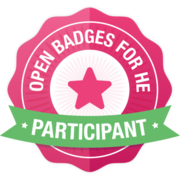Pigeon-holes. Not those, of course, of the physical variety in which you might keep racing birds, but those of the mind. That, and people’s seemingly-innate desire to find areas of common ground in any given situation. Combined, they’re a potent, but potentially destructive force in society.
“So… what do you do?” is a question I try not to ask. It’s only one step removed from, “What do you do for a living?”, asked explicitly to answer the implicit question “Are you of any value or interest to me?”. I have a three step strategy to answer such questions:
Questioner: So… what do you do?
Me: I work at Northumbria University
That satisfies 80% of queries. Sometimes that’s followed up by:
Questioner: Oh really, what do you do there?
Me: I work for an organization called JISC that’s based at Northumbria and deals with educational technology.
This deals with a further 15%. Only about one out of every twenty people ask for the full details:
Questioner: What type of things do you do?
Me: I work for a part of JISC called JISC infoNet. We’re funded indirectly by the taxpayer and provide guidance on digital technologies mainly to senior managers. We produce ‘infoKits’ which are detailed online briefings to get the further and higher education sectors up-to-speed on relevant topics. I’m currently working on some giving guidance about Open Educational Resources and mobile technologies. JISC saves the taxpayer more than thirty times what they cost to fund.
If all three questions have been asked, this usually leads to a longer conversation where we both get to talk about what we enjoy and find interesting in life. I am, of course, slightly more loquacious than the above, but you get the idea. :-p
Apart from my absolutely most-hated phrase which I will no doubt write about soon – a phrase banned in our house since the birth of our son – apart from that particular phrase, the one I revile most is the one which asks what you do for a living?. Every action and utterance has a symbolic element. In this case, the questioner not only assumes, but serves to endorse and reinforce, societal notions that what a person does to earn money is necessarily the defining feature of their life.
I’m currently reading a book about Greg Mortenson called Three Cups of Tea. Whilst I’ve only devoured the first six chapters, Mortenson has already attempted to scale K2, been kept alive by the hospitality of a tiny, remote, and very poor village, worked as a emergency-room nurse, slept in a car to make ends meet, and returned to Pakistan to build a school after raising money through the writing of 580 letters. How would he have answered, “So… what do you do?” at this point of his life, I wonder? I’m guessing he would barely mention what happens to pay the bills.
I do enjoy working at JISC infoNet – how could I fail to? It’s a flexible occupation where I’m surrounded by great people doing work that the sector respects and deems worthwhile. I didn’t enjoy my previous job, however. I was constrained and cajoled into doing things against my better judgement. Refusing to sell out, I changed jobs (and educational sectors) and took a pay cut, despite having moved my family to a different part of the country specifically for the previous position. I write this not to self-aggrandise, but to make a point:
Your mission in life is bigger than your job.
So what’s my mission? I’ll find the specifics later but I’ve got the broad brushstrokes: improving user outcomes. Let’s just check that back against what I wrote 14 months ago, shall we? Does what I said then still hold water?
So what do I do?
- I blend digital and physical worlds.
- I tell stories about how learning can be.
- I show people stuff.
- I research.
- I find the best of the best.
My job’s what I make it. I can live with that.
Is that still true? Absolutely. 😀

